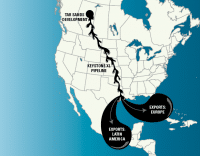There are four days left to submit a public comment to the State Department on the Keystone XL pipeline. As we’ve reported time and time again here on DeSmogBlog, the proposed Keystone XL tar sands pipeline would not improve America’s energy security as proponents of the pipeline insist. Nor would completion of the pipeline reduce gas prices here in America, another common claim.
Over a year ago, when the State Department was turning down TransCanada’s first bid, we took a look at why and how Keystone XL wouldn’t reduce gas prices here in the U.S.
This week, Public Citizen released a report that piles on a whole lot more evidence to support this fact. In fact, it makes a rock solid economic case that construction of the pipeline would almost certainly result in an increase in gas prices in the American Midwest. An increase.
For the report, titled “America Can’t Afford the Keystone Pipeline” (PDF download here), Public Citizen analyzed an abundance of data and found that average U.S. gas prices over the past year would have been as much as 3.5-percent lower had there not been any exports of oil. Because Keystone XL would primarily be an export pipeline (as we’ve reported again and again, and as Canadian Energy Minister Ken Hughes has recently admitted), all evidence points to the fact that construction of the pipeline would actually increase gas prices.
Here’s a quick rundown of the report’s main takeaways.
- By diverting oil from the U.S. market, the Keystone XL pipeline is likely to increase gasoline prices for consumers, a reality directly at odds with proponents’ claims that the pipeline will tamp down rising gas prices.
- By diverting tar sands from the Midwest refineries, the Keystone pipeline is likely to have particularly significant impacts on prices in the Midwest. TransCanada documents indicate that generating a higher price for tar sands oil is a primary purpose of the pipeline project.
- A Public Citizen analysis finds that, absent increased exports of refined gasoline, average U.S. gasoline prices over the past year would have been as much as 3.5 percent lower. The Keystone pipeline will intensify the trend of increasing exports relative to domestic supply, putting further upward pressure on consumer prices.
- Because the Keystone XL pipeline is designed to promote exports of refined tar sands oil, it will, if anything, reduce national energy security. This directly contradicts the claims of pipeline proponents, who routinely state or imply that the pipeline will increase U.S. energy security.
- Further confounding claims that the pipeline will advance U.S. energy security is rapidly increasing Chinese national government interests in Canadian tar sands. China has every right to undertake its investments in Canadian tar sands, but those investments do not advance U.S. energy security.
So much for the lowering gas prices and increased energy security talking points. But what of the State Department’s dubious claim that Keystone XL was “unlikely to have a substantial impact” on climate change? Oil Change International pretty much shredded that argument this week in a report of their own, “Cooking the Books: How the State Department Analysis Ignores the True Climate Impact of the Keystone XL Pipeline”
The key takeaway from that report: In a single year, the pipeline will add as much carbon dioxide to the atmosphere as all the cars in California, Washington, Oregon, Florida, Michigan, and New York combined.
So, yeah, sounds like a “substantial impact” to us.
Again, the State Department is accepting comments on the Keystone XL up until April 22. Never submitted a public comment before? 350.org has a really handy tool that lets you plug in your own facts and talking points, and they hope to gather at least 1 million comments by Monday.
Subscribe to our newsletter
Stay up to date with DeSmog news and alerts







